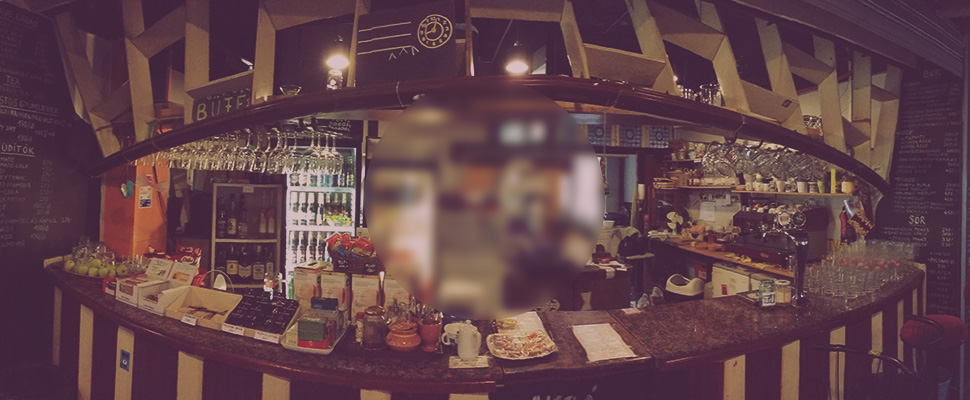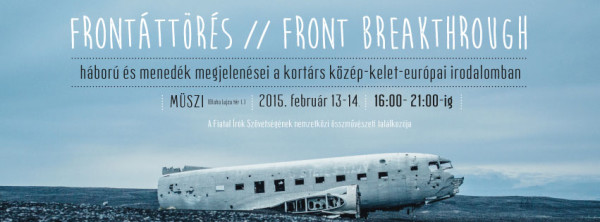Dátum/Idő
02.13. - 02.14. 16:00 - 23:00
Kategória(k)
appereance of war and shelter in contemporary central-eastern european literature
13-14th February, 2015
During the next episode of the series of international gatherings organized by the Association of Young Writers, we are going to discuss the artistic representation and possibilities of procession of war traumas with our Hungarian and Eastern European guests in the spaces of Müszi (Community Level) and Corvintető, Budapest. The apropos of the event is the 70th anniversary of the closing day of the siege of Budapest in the Second World War (13th February); the frame of it is the war and post-war situations of the region. The two-days event will involve many other fields of art: on the first day, participants will design and create an air raid cellar in a top-floor point of the building in order to bring up the problematic topics together and to install the physical and audovisual space of the discussions; while on the second day, interactive discussions and a participatory theater event will be held about the practical and theoretical depths of the topic.
Detailed Program:
13 February, 16:00-21:00
Those interested in the opinions of our guests from the podium should concentrate rather on the second day: our first day is to get together with the participants – guests and visitors –, and to have space for personal discussions and building something together during the workshops.
The design and installation of the space where we will have our discussions will be supported by Balázs Tóth (visuals) and Panda (sound) in order to create a mutual representation of air raid shelters in 2015.
Participants are kindly asked to bring any kind of instrument or object with them, which they think could suit or could be useful in an air raid shelter during wartime. We also ask everyone to collect words, sentences from any resource (let that be a family story or a piece of literature) which is connected to surviving war and war traumas. The obejcts can be handed in earlier from 9th to 12th February as well
2015. február 14.
16:00-18:00 Siege Constellations (forum theatre)
Participants of the discussions and anyone interested (and registering soon enough) will have a common forum theatre event, where they portray the groups of problems generated during a siege and in an air shelter.
The session will be led by Viola Kallós and Gyurig Benedek.
Roundtable Discussions
17:00-18:00 Constraints of Symbiosis: Space Use in the Hinterlands
Monika Błaszczak (PL), Aaron Blumm, Potozky László, Tompa Andrea
mod: Csepregi János
What happens in the hinterlands of war? The existing communities and social behaviours change and forced new communities (re)appear. How do the relations to private property change (shelters, open gardens of houses, robbings and defense of houses)? It is a series a masculine (stories about losses and war heroes etc.) and a feminine (strategies of survival, suppression of rape etc.) stories in the mean time. What are the values to make business of? Is it possible at all to learn or access the experience about this?
18:15-19:15 Poetics of Blood
Mészáros Márton, Nemes Z. Márió, Tinkó Máté, Urbán Bálint
mod: Serestély Zalán
The description and relation systems of the own and the other’s body had become a very significant topic in the past decade(s): is there any possibility to process the own body trauma in a community field? Is there any possibility to let this topic go? Is it really so important to recall in order to live through? How do the violent causes of death incorporate into the events of living after it? Is there a general truth to state about this, or is it rather stories of heroes, fractured bodies and deviant body experiences overemphasised within the narration?
19:30-20:30 The Smell of War
Gökçenur Çelebioğlu (TR), Marko Čudić (SRB), Melike İnci (TR), Aneta Kaminska (PL), Kollár Árpád
mod: Szőllőssy Balázs
And how do we narrate all these in contemporary war and fighting situations: is there anything what changed in the past 70 years? What kind of communicational and narrative tricks hide (or sometimes exopse) war traumas; what kind of possibilities does power have through language and on the reverse, language through power to strengthen its own positions? What is the effect of closeness and distance of a war space on the possibilities of narration?


